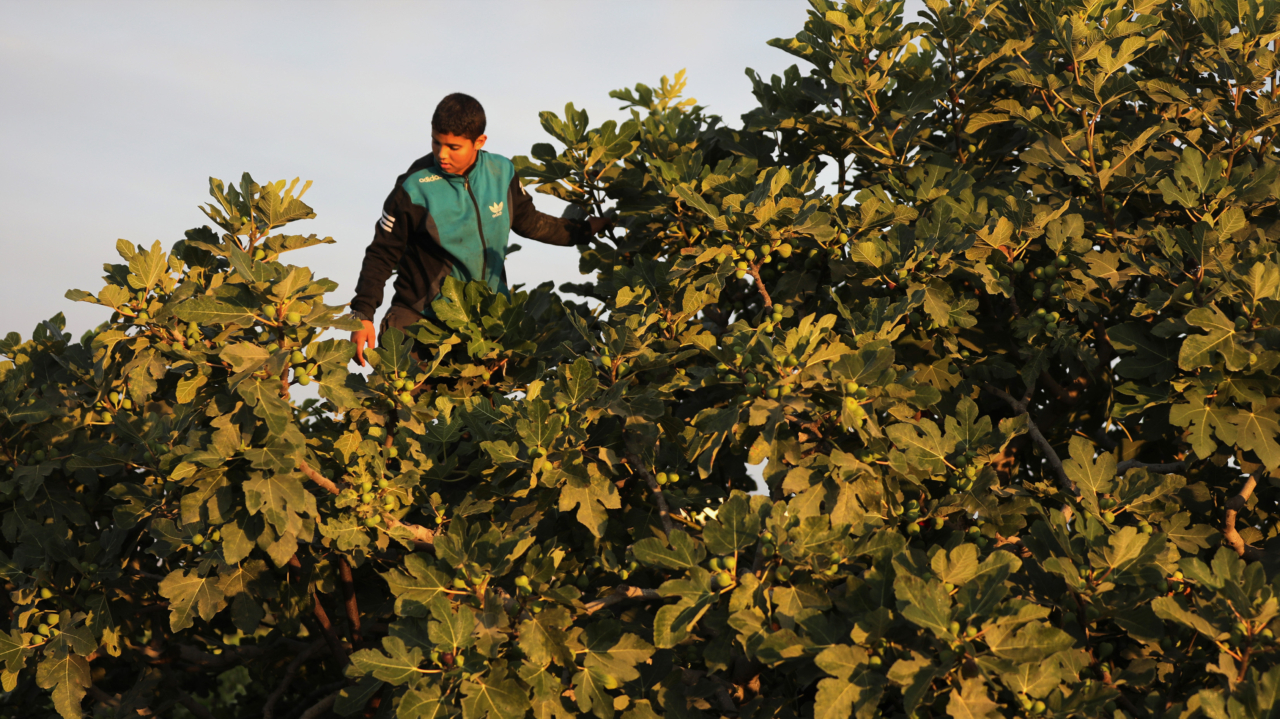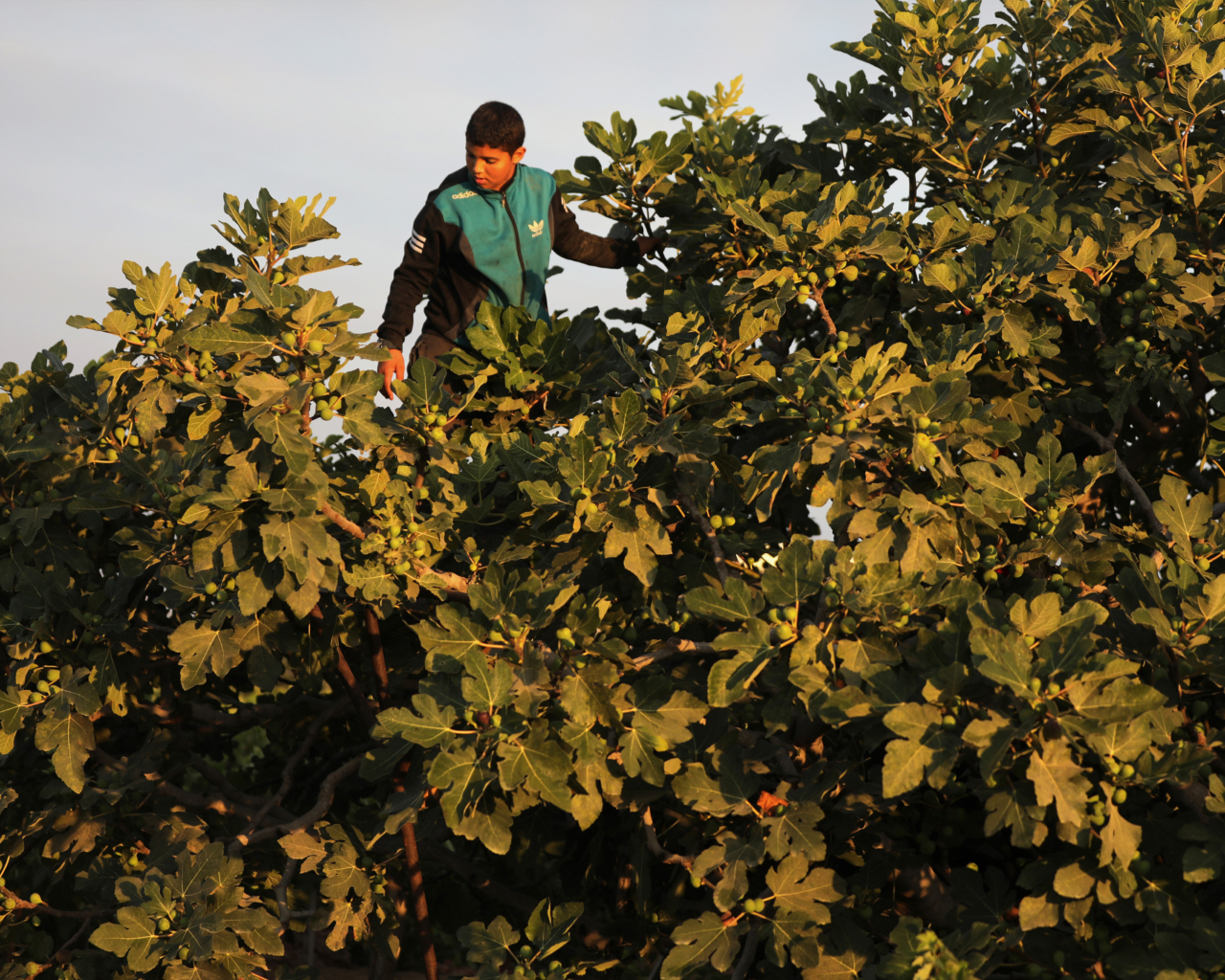

Photograph by NurPhoto / Getty
words by yessenia funes
Daoud Nassar’s family has stewarded their farm for generations. The Tent of Nations—vast enough to cover 75 football fields—is over 100 years old. His father officially registered the land southwest of Bethlehem in 1924. Nassar’s father and uncle grew up in natural caves on the property. “From the beginning, there was a spiritual connection with the land,” Nassar said. The rocky hilltop offers a stunning view of ancient terraces that Palestinians engineered to farm on mountain slopes without losing soil to the rains. The terraces—steps made of limestone and grass—look like stairways to the valley below, handcrafted by the people who best know the earth.
Atop the hill, the Nassar family’s neighbors are also visible: five illegal Israeli Jewish settlements, which have inched closer to their home since the 1970s. Settlers have long targeted the bodies and the trees of the land, sometimes daily, sometimes once a week. At the farm entrance, a stone is etched with Tent of Nations’ nonviolent philosophy: “We refuse to be enemies.” Since 2002, the family has hosted volunteers from across the globe to bear witness to their struggle and tend to the farm. International presence deters would-be settler attacks by providing what advocates call “protective presence.” In return, volunteers leave with a newfound understanding of Palestine and its people’s fight for liberation.
“It’s not just about coming to work,” Nassar said. “It’s about coming to learn but also to be encouraged. We want the volunteers to go back home and be changemakers, peacemakers in their communities.”
As this year’s olive harvest approaches, the land calls yet again on its caretakers near and far. The mountain winds ask those who hear its howls to show up—in solidarity with the soil and the souls of Palestine. The region’s agricultural sector, from individual farms to organizations, opens applications annually for local and international volunteers to assist families across the West Bank. Some groups cover travel costs; others can’t. The logistics have become increasingly challenging two years into Israel’s unfettered assault on Palestine.
International volunteers are an imperfect response to an occupying power—not even foreigners are safe—but the stakes have never been higher. A people’s existence is on the line.
The world has seen a genocide unfold in real time for two years. Since the Palestinian militant group Hamas killed some 1,200 people and took another 250 hostage in Israel on October 7, 2023, Israel has indiscriminately bombed Gaza, killing at least 66,000 people. The vast majority have been civilians, including children. The United Nations finally determined in September that Israel is committing genocide in Gaza. This came long after the same conclusion from several human rights groups, including Amnesty International, Human Rights Watch, and Israeli organization B’Tselem.
Meanwhile, Israel has escalated its violence in the West Bank: As of September 15, Israeli forces and settlers have killed at least 186 Palestinians there since the start of 2025. Now, United States President Donald Trump and Israeli Prime Minister Benjamin Netanyahu have proposed a plan to end the war and swap prisoners without affording Palestinians any real autonomy or self-determination. International solidarity is urgent and needed, explained Dr. Mazin Qumsiyeh, founder and director of the Palestine Institute of Biodiversity and Sustainability at Bethlehem University. It’s also become more dangerous.
“During these difficult times, of course, there are less internationals coming in,” he said. “There is genocide. There is a war on Gaza and on the West Bank by the colonizers … It’s making some solidarity activists fearful. If they come here, are they going to be allowed in? Are they not going to be allowed in? Is it safe? Is it not safe?”
Qumsiyeh’s institute used to host up to 11 people at a time, the most it can comfortably accommodate. Currently, he has just two. The Palestinian Farmers Union used to receive 2,000 volunteers a year. Last year, only 200 arrived; this year, the union expects none. Advocates expressed that they’ve seen plenty of interest, but the occupation creates obstacles for international volunteers.
The climate crisis and reduced rainfall exacerbate these tensions. Our planet is heating due to the continued extraction and burning of fossil fuels. Precipitation patterns become less predictable, and the trees suffer. So do the people whose livelihoods depend on the olive oil they produce. Every tree is valuable—spiritually and economically. Every tree that farmers can’t reach is an immeasurable loss. So families take the risk even under mounting challenges.
“Farmers are resisting by going to their land and harvesting,” said Abbas Milhem, executive director of the Palestinian Farmers Union and a farmer himself.
“It’s not just about coming to work. It’s about coming to learn but also to be encouraged. We want the volunteers to go back home and be changemakers, peacemakers in their communities.”
Since October 7, 2023, settler attacks have kept Milhem and his neighbors from their own lands. For farmers like them who haven’t been able to cultivate their crops since Israel began its genocide, this season is their last chance. The Israeli government relies on an old Ottoman law to seize Palestinian land for the state if it hasn’t been cultivated for three years.
“By restricting Palestinians’ access to their lands, Israel systematically steals more Palestinian lands,” said Jamal Juma’, coordinator of Stop the Wall, an organization striving to tear down the apartheid wall separating many Palestinians from their ancestral lands while partnering with groups like the farmers union, in an emailed statement. “Many Palestinians are expecting this olive harvest to be a ‘bloodbath’ as settler attacks have been accelerating, and the settler militias are being systematically armed by the state.”
Since September, the Israeli government has opened the door for another 100,000 Israelis to legally buy guns. At the same time, Israel indefinitely closed the Allenby Bridge, popular among Palestinian allies and the only official crossing between the West Bank and Jordan.
Still, volunteers will find a way. They always do. They have for decades.
The olive harvest has historically been a time of community and ceremony. Parents would take their children and elders to the fields every October. The little ones would climb trees. Joyous songs would erupt across the valley as fingers picked olives off their branches.
“The most salient phenomenon that emphasizes the communal values of Palestinians during this season is O’nah, which translates to assistance or aid,” Juma’ said. “Historically, O’nah implied that people who finish picking their olive trees early during the harvest season start helping their neighbors to harvest their trees.”
But such festivities grew more challenging as the Israeli occupation expanded. As the Second Intifada unfolded at the turn of the 21st century, international solidarity reached new heights, explained Qumsiyeh. Grassroots volunteer campaigns began to emerge. There’s the Tent of Nations, whose volunteer programs include a children’s summer camp. Perhaps the most popular group is the International Solidarity Movement, which has brought volunteers to Palestine since 2001. The “You Are Not Alone” campaign, led by the Palestinian Farmers Union and Stop the Wall, has also existed for over 20 years. The Dalia Association, a local foundation that financially supports local farmers, also offers a volunteer program.
“La vìa campesina [a peasants’ food sovereignty movement], the slogan is ‘globalize the struggle, globalize hope,’” said a representative of Ramallah-based Union of Agricultural Work Committees who was granted anonymity for their safety. “The olive harvest campaign is really a manifestation of these values—of globalizing the struggle and globalizing hope where we have people from around the world who are coming to support the Palestinian peasant struggle.”
“The liberation of Palestine is connected to all of our humanity.”
On the other hand, Israeli occupation often manifests in death. In 2003, an Israeli bulldozer crushed American activist Rachel Corrie to death as she stood strong to prevent the demolition of the family home where she was staying in Rafah in the Gaza Strip. She was 23 years old. In 2024, Israeli forces killed Turkish American activist Aysenur Ezgi Eygi. They shot the 26-year-old in the head while she protested illegal settlements in Beita in the West Bank.
People come from France, Italy, Australia, Sweden, the Netherlands, Belgium, and even Israel to spend weeks, if not months, with Palestinian families. One French Jewish man, who was granted anonymity given the threats volunteers face, has been to Palestine twice. His first time was during the Second Intifada in 2001. He returned for last year’s harvest and will return yet again this year. He likes to feel helpful. “Working in a place provides a lot of very important details about everyday life,” he wrote in a message. “Many stories are told while working in the olive field.”
Back at the Tent of Nations, graduate student CatiAdele Slater helps the Nassar family water the trees and feed the animals. All the while, she listens. Through her conflict transformation research for Eastern Mennonite University in Virginia, she wants to understand how people persevere nonviolently.
“What are the rhythms that sustain that nonviolent stance and that nonviolent presence within not only the volunteers but, really, truly, this family to continue the work that they’re doing?” she said over a Zoom call.
This will be her first olive harvest, but she’s already thinking about the seeds and the soil. About the holy connections the earth sows across borders.
“The liberation of Palestine is connected to all of our humanity,” she said.
Every seed has the potential to bear fruit—but only with sufficient water, light, and love. These volunteers learn to nurture life on the land. They take those lessons home to plant even more seeds and spread the Palestinian message—of resistance, peace, and independence.
Volunteers On Palestinian Farms Are More Valuable—and Scarce—Than Ever